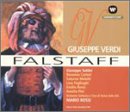| All Artists: Giuseppe Verdi, Mário Rossi, Turin Radio Symphony Orchestra & Chorus, Amalia Pini, Anna Maria Canali, Cristiano Dalamangas, Emilio Renzi, Gino del Signore, Giuseppe Nessi, Giuseppe Taddei, Lina Pagliughi, Rosanna Carteri, Saturno Meletti Title: Falstaff Members Wishing: 0 Total Copies: 0 Label: Fonit Release Date: 3/26/2002 Genre: Classical Style: Opera & Classical Vocal Number of Discs: 2 SwapaCD Credits: 2 UPC: 793515229027 |
Search - Giuseppe Verdi, Mário Rossi, Turin Radio Symphony Orchestra & Chorus :: Falstaff
 | Giuseppe Verdi, Mário Rossi, Turin Radio Symphony Orchestra & Chorus Falstaff Genre: Classical
|
Larger Image |
CD Details |
CD ReviewsMa ride ben chi ride / La risata final. But he laughs best L. E. Cantrell | Vancouver, British Columbia Canada | 05/12/2006 (5 out of 5 stars) "Source: Broadcast by Radiotelevisione Italiana, October 2, 1949 and subsequently issued on 78 rpm records by Cetra.
Sound: Good mono from what might be termed the end of the electronic recording era and just before the beginning of the high fidelity era of the early 1950s. Cetra recordings were notoriously harsh in sound, causing many to reject them outright. However, the most recent digital remasterings of the Cetra series have proven themselves to be unexpectedly successful. While still constricted by modern standards and a bit over-resonant, the sound is generally pleasing and full of detail. Voices are well-captured and given prominence over the orchestra, as was the style of the times. Cast: Sir John Falstaff - Giuseppe Taddei; Ford - Saturno Meletti; Alice Ford - Rosanna Carteri; Nanetta Ford - Lina Pagliughi; Meg Page - Anna Maria Canali; Mistress Quickly - Amalia Pini; Fenton - Emilio Renzi; Dr. Cajus - Gino Del Signore; Bardolfo - Giuseppe Nessi; Pistola - Cristiano Dalamangas. Conductor: Mario Rossi with the Orchestra Sinfonico e Coro di Torino della RAI. Documentation: Libretto in Italian. Short summary of the plot. Pictures of canny old peasant Verdi, wonderfully scowling librettist Boito and the first Vecchio John, Victor Maurel, in all the bulky glory of his lady courting costume, as well as images of other principal singers of the first production. Track list that identifies the characters singing and provides timings. The Italians say, "We gave Gobbi to the world but we kept Taddei for ourselves." Taddei and Gobbi were the two great, mid-Twentieth Century exemplars of the Fat Knight. Both displayed enormous dash and understanding of wine-soaked, indomitable, old Jack Falstaff. Taddei had the better voice and a marvellous range of moods. Listen to the changes he rings in his voice as he speaks dismissively of honor, as he comes a-wooing, as he reacts to being called "reverenza," as he offers greetings to his supposed client, Signor Fontana. If the remainder of the all-Italian cast is not quite the equal of Karajan's ensemble for his stereo recording of 1956, they are, nevertheless, very good and display an instinctive understanding of the piece that easily surpasses most subsequent polyglot casts. Anna Maria Canali has a natural feel and sound for Alice Ford that Karajan's Schwarzkopf, for all her technical prowess, does not equal. Saturno Miletti, in fine voice, does all the right things as jealousy-consumed Signor Fontana and as outwitted head of the Ford household. Lina Pagliughi is, I think, just surpassed by Anna Moffo on Karajan's set, but she is still very good. Amalia Pini offers a Mistress Quickly who sounds somewhat older and hootier than Fedora Barbieri for Karajan or Chloe Elmo for Toscanini, but she is both funny and good. Emilio Renzi was not a technician to compare with Karajan's Luigi Alva, but he sounds far more ardent and entirely more convincing as the guy hopelessly in love with the pretty girl next door. Rossi was an experienced conductor with a real feel for this opera. The RAI Turin Orchestra sounds fine, being very much on home ground with Verdi. This is for all intents and purposes a live performance and so there are a few inevitable rough spots. Nevertheless, the energy and authenticity of this "Falstaff" make it one of the great performances. Five stars." |

 Track Listings (20) - Disc #1
Track Listings (20) - Disc #1